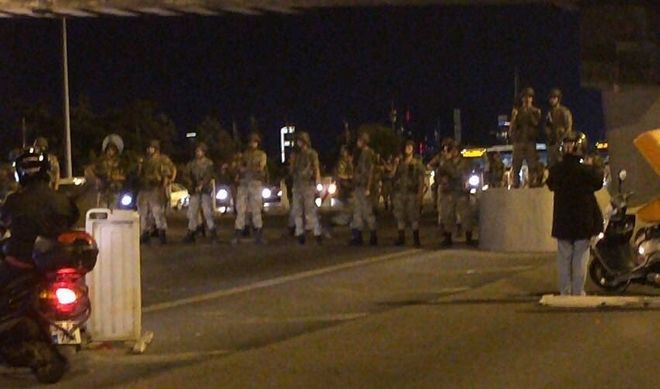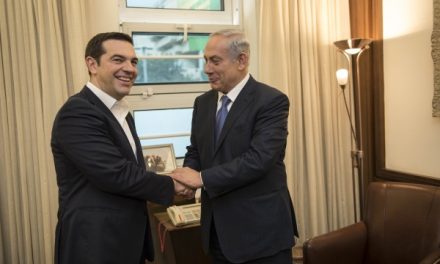Whatever new reality emerges in Ankara this weekend, it is not good news for the United States and its NATO allies.
NATO member Turkey is the front line and home base for much of the coalition’s counterterrorism operations in neighboring Syria. It is Europe’s jury-rigged solution to the crisis of refugees pressing westward from the Middle East.
Although the Obama administration has been frustrated and irritated by the civilian government of President Recep Tayyip Erdogan, and finds the military much easier to deal with, a Turkish coup could trigger statutory requirements to cut all U.S. assistance, challenging the U.S. reliance on Turkish military installations in the war against the Islamic State.
The administration managed to brush off demands from some U.S. political factions to sever aid following military takeovers in Egypt and Thailand, refusing to label the actions “coups.”
“But this is Turkey,” said Henri Barkey, a Turkey expert and director of the Middle East program at the Wilson Center. “This is a NATO country. There’s a big difference.”
At the same time, an Erdogan government restored to power would probably be even more prickly and paranoid than before. The White House waited several hours after initial reports that a coup was underway to make a strong statement opposing it.
The statement said that President Obama and Secretary of State John F. Kerry, in Moscow, had spoken by telephone and “agreed that all parties in Turkey should support the democratically-elected government . . . show restraint, and avoid any violence or bloodshed.”
Kerry later issued his own statement, saying that he had spoken to Erdogan’s foreign minister, Mevlut Cavusoglu, and emphasized “the United States’ absolute support” for “civilian government and democratic institutions.”
NATO’s founding treaty does not address what to do about military takeovers and has no suspension provisions. Previous coups in Turkey, Greece and Portugal provoked little substantive change in relations with the alliance.
But confirmation of an overthrow of the government would throw Turkey’s application to join the European Union to the winds, further hurting an economy already damaged by terrorist attacks. Among the many questions it would open is whether military rulers would be willing to continue restraining the more than 2 million Syrians and other refugees Turkey is housing from trying to get to Germany, Scandinavia and elsewhere in Europe.
Although Turkish efforts have improved in the past year, the United States and Europe suspect Erdogan’s increasingly Islamist government of divided loyalties in the counterterrorism fight. Turkey has been accused of allowing foreign fighters to slip across the border to join the Islamic State in Syria and of supporting non-democratic opposition fighters there who share its zeal to overthrow Syrian President Bashar al-Assad.

For his part, Erdogan has railed against U.S. support for Syrian Kurdish fighters willing to take on the Islamic State but allied with Turkey’s own Kurdish separatists.
“It’s a very difficult situation for Western countries,” Marc Pierini, a Eurasia expert at the Carnegie Endowment for International Peace, said of the unfolding coup. “But it may not be totally disruptive for the coalition.”
“Erdogan has been ambivalent with ISIL,” he said, using an alternative acronym for the Islamic State, “partly because he wanted to go after Assad . . . and partly because there is big business on the border.” Only about 65 miles of open border remains unoccupied by Syrian Kurds and available for the transit of militant supplies and fighters. The United States has asked Turkey to use its own military to help prevent that section of border from being taken over completely by the Islamic State, a step Erdogan has so far been unwilling to take.
Defense officials at the Pentagon, speaking on the condition of anonymity to discuss the attempted coup as it unfolded, said Friday that they were aware of what was occurring in Turkey but still working to determine its effects on U.S. operations.
The Pentagon has increasingly relied on Turkish military installations to wage its counterterrorism war in Iraq and Syria. In particular, U.S. troops at Incirlik Air Base near the southern border with Syria and at Diyarbakir airfield in the southeastern part of the country have a direct role in the military campaign against the militants.
“We are monitoring the situation in Turkey closely and taking appropriate steps to ensure the safety and security of our service members, civilians, their families and our facilities,” said a senior U.S. defense official.
“As of this time, there has been no impact to Incirlik Air Base and counter-ISIL air operations from Incirlik continue,” the official added.
An A-10 squadron has been based at Incirlik since October, after the Turkish government allowed U.S. strike aircraft to use the base. An Air Force commander there said in May that his unit handled one-third of all refueling operations for the air war over Iraq and Syria. Use of the base immediately improved how long the aircraft could remain over Iraq and Syria, considering its close proximity when compared with military bases used by the Pentagon in Persian Gulf countries.
Senior defense officials also said in April that they were planning to place a mobile rocket system known as HIMARS, short for High Mobility Artillery Rocket System, somewhere in Turkey to support U.S. operations in Syria.
In other parts of Turkey, U.S. troops use an air base in Izmir, about 200 miles southwest of Istanbul, and Aksaz Naval Base, on the Aegean coast. In March, the Pentagon and State Department ordered the families of U.S. troops and diplomats to leave the country, citing security concerns raised by terrorist attacks across Turkey.
It also was not immediately clear what effect the coup plot had on the U.S. Embassy in Ankara, Turkey’s capital, and at consulates in the cities of Adana and Istanbul. A statement released by the embassy in Ankara told U.S. citizens that the Turkish government had warned of a coup attempt.
“We urge U.S. citizens to contact family and friends to let them know you are safe,” the embassy’s statement said. “We have seen reports that social media is blocked, but you can contact friends and family by email, telephone or SMS. We encourage U.S. citizens to shelter in place and do not go the U.S. Embassy or Consulates at this time.”
As uncertainty continued throughout Turkey overnight Friday, experts were not optimistic.
“If it’s a coup, it’s bad no matter what,” said Barkey, speaking by telephone from Istanbul, where he had planned a conference on Iran. “If it’s unsuccessful, it’s still bad. . . . Now, Erdogan is going to be even more paranoid and very suspicious.”
Riven by divisions between his supporters and more-secular Turks, including the military, Erdogan has fought to increase his powers through revisions to the constitution. Even if he survives and succeeds in strengthening his constitutional position, Barkey said, “he’s going to become even more erratic and problematic for us.”
“No matter what happens, Turkey is now in a period of uncertainty and instability. Successful or unsuccessful,” he said of the coup attempt, “this is bad for the United States and the alliance.”
Dan Lamothe contributed to this report.



















